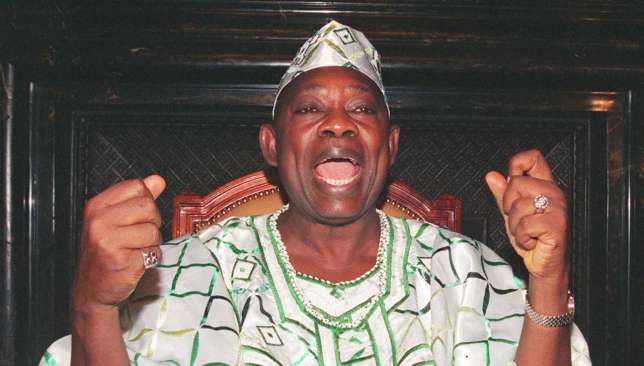LAGOS, Nigeria — As Nigeria marked 32 years since the annulment of the June 12, 1993 presidential election, Olalekan Abiola, son of the late Chief Moshood Abiola, has spoken candidly about the toll the political crisis took on his family and the unfulfilled promises that linger decades later.
Speaking from the family’s residence in Ikeja, Lagos, during commemorations last week, Olalekan Abiola recalled the trauma his family endured following the incarceration and death of his father, the presumed winner of the annulled election, and the assassination of his mother, Kudirat Abiola.
“Honestly, it’s been 27 years of trauma, especially with my mother’s assassination,” he said.
“One minute my mom was at home, in good health, and the next minute she had been shot. So that was more painful, more traumatic than the fate my father suffered.”
Chief MKO Abiola was imprisoned in 1994 after declaring himself the rightful president-elect.
He died in detention under controversial circumstances in 1998.
His wife, Kudirat, was assassinated in 1996 in Lagos while actively campaigning for his release.
“But now that my mother has been killed, we were hoping that my daddy will come back to us, so that we will be able to try to rebuild our lives,” Olalekan added.
“That never happened. So it happened that, basically, due to June 12th agitation we lost both parents.”
Olalekan said the Abiola children have managed to survive largely due to the foresight of their parents in ensuring they were all well educated.
However, he noted internal family rifts, particularly with his older brother, Kola Abiola, who he claims has not shown leadership in uniting the extended Abiola children.
“Kola has not been able to bring us all together. He seems to only care about his own mother’s kids,” he said.
“Brother Kola ordinarily ought to be the leader for all the children of the late MKO. He should be the leader of all the children.”
He also accused Kola of taking control of their father’s businesses to the exclusion of others.
According to Olalekan, the family has received repeated but unkept promises from successive Nigerian governments regarding debts owed to MKO Abiola’s businesses for services rendered to various ministries.
“They, Federal Government till date, promised to pay the debts that they are owing my father to the family. They never did it till the moment,” he said.
He cited outstanding debts from the Ministry of Communications, Ministry of Education, and Ministry of Defence, noting that former presidents, including Olusegun Obasanjo and Goodluck Jonathan, made commitments to address the matter but failed to follow through.
“Now that President Bola Tinubu is there, hopefully he is going to do the audit and pay off the long outstanding debts,” he added, although he acknowledged that Tinubu has not yet directly addressed the matter with the family.
While the Federal Government under President Muhammadu Buhari officially designated June 12 as Democracy Day in honour of Abiola, Olalekan believes more must be done to properly recognise his father’s sacrifice.
“To properly immortalise him, I am calling on government to consider giving him the honour of putting his picture in the Presidential Villa among the pictures of past Nigerian presidents who served the country in the past,” he said.
He argued that MKO, though never sworn in, was the only elected president whose victory was widely acknowledged by Nigerians across religious and ethnic lines.
“This was a Yoruba man who, though was a Muslim with a Muslim running mate, was still voted for massively by Christians. He was a Yoruba man who defeated a Hausa-Fulani man in his home state of Kano,” Olalekan said.
He urged that all benefits and allowances due to his father as a former president should be paid to the family, in line with what is accorded to other Nigerian leaders.
Reflecting on MKO’s enduring legacy, Olalekan said his father was “ahead of his time” and viewed as a unifying figure in Nigeria’s political landscape.
He emphasised his father’s deep Islamic faith and commitment to charity as defining traits.
“He raised us to pray five times a day and engage in charity which we call Sadaka in Islam.
He used to say, ‘I am not carrying this money anywhere. So let me just help people,’” he said.
Olalekan also spoke about the large number of women who associated with MKO during his lifetime, attributing their presence to his generosity rather than personal indiscretions.
“About 120 children came forward to say they were MKO’s children but only 54 of them passed the DNA test at the end of the day,” he revealed.
Despite the pain and political betrayal the family experienced, Olalekan expressed satisfaction that Nigerians still remember MKO with reverence.
“The man has been dead for 27 years, yet Nigerians are still bringing his memory back to life as if he died two weeks ago,” he said.
“It is incredible.”
Olalekan Abiola also expressed support for equitable representation in Nigeria’s democracy, noting that the South-East should be next in line for the presidency.
“There is more equity in the system now than what it used to be,” he said.
“Next time the presidency comes to the South, it should go to the South-East because they have not gotten it yet.”
He concluded by underscoring the importance of June 12 as a symbol of sacrifice and democratic progress.
“It means that every year Nigerians will have to remember the struggles of those who brought about the current democracy that everyone in the country is enjoying now, for which my father and my mother paid the supreme price.”







